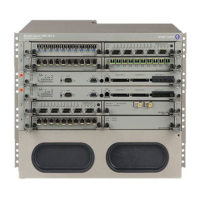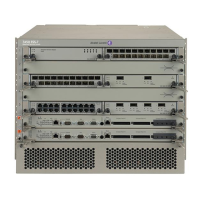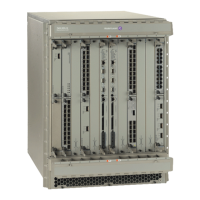Label Distribution Protocol
7450 ESS MPLS Guide Page 585
LDP Enhanced Graceful Handling of Resources
This feature is an enhanced graceful handling capability which is supported only among SROS
based implementations. If LDP tries to resolve a FEC over a link or a targeted session and it runs
out of data path or CPM resources, it will put the LDP/T-LDP session into overload state. As a
result, it will release to its LDP peer the labels of the FECs which it could not resolve and will also
send an LDP notification message to all LDP peers with the new status load of overload for the
FEC type which caused the overload. The notification of overload is per FEC type, i.e., unicast
IPv4, P2MP mLDP etc., and not per individual FEC. The peer which caused the overload and all
other peers will stop sending any new FECs of that type until this node updates the notification
stating that it is no longer in overload state for that FEC type. FECs of this type previously
resolved and other FEC types to this peer and all other peers will continue to forward traffic
normally.
After the user has taken action to free resources up, he/she will require manually clear the
overload state of the LDP/T-LDP sessions towards its peers. Detailed guidelines for using the
feature and for troubleshooting a system which activated this feature are provided in Section 7.3.
The enhanced mechanism will be enabled instead of the base mechanism only if both LSR nodes
advertize this new LDP capability at the time the LDP session is initialized. Otherwise, they will
continue to use the base mechanism.
This feature operates among SROS LSR nodes using a couple of private vendor LDP capabilities:
• The first one is the LSR Overload Status TLV to signal or clear the overload condition.
• The second one is the Overload Protection Capability Parameter which allows LDP peers
to negotiate the use or not of the overload notification feature and hence the enhanced
graceful handling mechanism.
When interoperating with an LDP peer which does not support the enhanced resource handling
mechanism, the 7x50 reverts automatically to the default base resource handling mechanism.
The following are the details of the mechanism.
LSR Overload Notification
When an upstream LSR is overloaded for a FEC type, it notifies one or more downstream peer
LSRs that it is overloaded for the FEC type.
When a downstream LSR receives overload status ON notification from an upstream LSR, it does
not send further label mappings for the specified FEC type. When a downstream LSR receives
overload OFF notification from an upstream LSR, it sends pending label mappings to the
upstream LSR for the specified FEC type.

